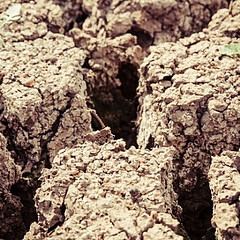
Drought, which is caused by long periods of dry weather or insufficient rainfall, creates deserts in areas where it is a permanent condition. In other parts of the world, drought may be a regular seasonal feature for part of the year and predictable year after year.
Where weather conditions are balanced by a wet season, water can be stored to last through the dry months. The underground stone-cut or concrete-built cisterns of ancient and modern Mediterranean civilizations collect rainfall of the wet season for the long, dry summer.
In temperate regions, if rainfall drops far below the normal, periodic drought may be produced with vegetation unable to obtain water to compensate for what it loses to the air. In cases where the dry spell may not be so obvious, but there is still insufficient moisture to provide that needed by the plants, a condition known as the “invisible drought” occurs.
The death of vegetation causes deprivation right through the food chains that are based upon it. If the drought becomes severe, dead and dying animals may even pollute the water supplies that still remain.
Fire Risk
The corpses of dead animals should be buried in deep graves. Dry ground can be very hard, but burying is the best way to remove these possible sources of infection. They could be burned, but since drought leaves everything tinder-dry, the risk of fire spreading is considerable and could easily get out of hand. Each year, fires rage in southern France, California and Australia and without water to check the flames, they spread rapidly. If you must have a fire, dig down to bare earth and keep the fire small and attended at all times.
Hygiene
In houses, lack of water for washing and sanitation can bring the risk of infection.
If the water level in a toilet no longer fills the “S-bend”, disease may spread from the sewers and personal hygiene may suffer from lack of washing. Do not use the toilet – leave sufficient water in the bowl to form a barrier. Make an outdoor latrine to use instead (see make camp section for details).
Sweating will help to keep pores open and free of dirt, but even when you need all available water for drinking, try to clean hands after defecation and before preparing food to reduce the risk of infection.
Store & Conserve Water
If the rainy season does not start at the expected time, or a hot, dry summer produces a parched earth, take precautions by storing as much water as possible and using it wisely. Keep it covered and shaded to avoid contamination and evaporation.
I have found that rain barrels are great for such needs. You will have to evaluate your environment (a.k.a your backyard) to determine if this is an option. In my case I was able to cut a small section from the downspout of my house using a small metal saw and put the rain barrel underneath it. I also picked up a rain barrel stand to give it a little height so I could connect a garden house.
If this is not an option, or if you did not have time to prepare, here is an alternative: Dig a pit for a storage cistern in a shaded spot, avoiding tree roots. Line it with a polythene (a.k.a polyethylene) sheet or with cement if available (but don’t fill it up until the cement has had a chance to thoroughly dry).
If you live in a clay area, dig a pit and line it with clay. If you build the concrete or clay up into a partial dome, it will help to keep the contents cool. Leave a smaller opening to keep covered.
NEVER waste water. Water used for cooking can later be used for washing. Boil all drinking water. If a well runs dry you may gain more water by digging deeper, but the further you dig, the further you deplete the water stored in the ground.
In areas with cold nights the drop in temperature may condense the moisture in the air. Use the techniques to catch it described for desert survival (see Environment: Desert/Arid).
High ground will show greater variation between day and night temperatures and will offer a better chance for dew to collect in the morning. It may also offer the advantage of cool breezes.
When nature is disturbed by drought conditions, animals act abnormally. Crazed by thirst, normally docile creatures may attack you, so be careful around them.